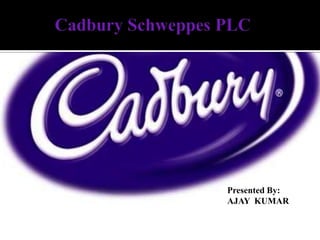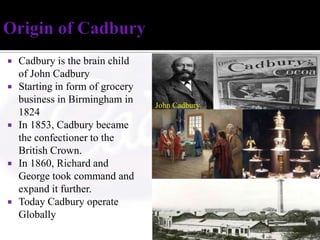Cadbury
- 1. Cadbury Schweppes PLCPresented By:AJAY KUMAR
- 2. Introduction
- 3. LocationCadbury is a British company and bases many of its operations in Britain. This area has some of the highest wage rates.Now that Kraft has bought the company, they are strategically looking to phase out many operations in Britain for cheaper areas of labor such as Eastern Europe and overseas countries.
- 4. Origin of Cadbury Cadbury is the brain child of John Cadbury Starting in form of grocery business in Birmingham in 1824In 1853, Cadbury became the confectioner to the British Crown.In 1860, Richard and George took command and expand it further.Today Cadbury operate Globally John Cadbury
- 5. Cadbury Schweppes PLC: Overview Cadbury Schweppes PLC is a British confectionary companyHeadquarters in Uxbridge, England.The oldest and largest family-run businesses in the worldIn 1969, it merged with Schweppes LimitedThird leading producer of soft drinks and fourth leading confectionery manufacturer in the World.
- 6. How large Cadbury Schweppes PLC ?Around 65,000 Employees35,000 direct and indirect SuppliersDirect operation over 60 Countries
- 7. The Industry in which the Company OperatesThe Food and Beverage Industry: Fiercely Competitive MarketplaceGlobal market forcesConsolidationChanging consumer preferencesIncreasing government regulations
- 8. Product and Major Brands Three kinds of confectionery: Chocolate (55%),┬ĀGum(14%) and Candy(31%)13 focused Brands12 focus markets7 focus customersIndiaUSASouth AfricaChinaBrazilJapanMexicoUKTurkeyFranceRussiaAustralia
- 9. Operations Strategy of Cadbury
- 10. Operations StrategyMission: Financial Scorecard, judiciously reinforced by our Priorities, Commitments and Culture.Vision: to be the WorldŌĆÖs biggest and best Confectionery CompanyCore Values: Performance, Quality, Respect, Integrity and Responsibility
- 11. Global Strategy + Mission SupportiveGrowth: Profitable Growth in Emerging market (India, China, Russia)Cost & Efficiency: Managing brands on a global basis, Outsourcing low value added processes and Reconfiguring Manufacturing Network.Disciplined Investment: In 2007, Partnership with Barry Callebaut (the worldŌĆÖs largest Cocoa processing Company)Superior Returns: Strong Dividend Growth, an Efficient Balance Sheet, consistent improvements in ROIC
- 12. Using Operations to Compete
- 13. CadburyŌĆÖs Market Position and Competitive Environment Participates in the Global Competitive Marketplace
- 14. Core Processes to delivery the Final ProductInternal and External CustomersOutputsInputsProcesses and OperationsDelicious Chocolate, Gum and Candy And BeveragesCacao varieties
- 15. Processing
- 16. Blending
- 17. Cinching
- 18. Tempering
- 19. Storage
- 20. Milk
- 21. Cocoa
- 22. Palm Oil
- 23. Other Grocery ProductsInformation on PerformanceSource: Krajewski, Ritzman, & Malthora, 2010
- 24. Recent Trends in Operations Management and Cadbury
- 25. Going GreenŌĆ”ŌĆ”ŌĆ”ŌĆ”..ŌĆ£Purple Goes GreenŌĆØ is the part of CadburyŌĆÖs Strategic Mission and Vision ( Objective: reduce 50 % Carbon Emissions & 10 % reduction in Packaging by 2020).Link with SingaporeŌĆÖs Sustainable Manufacturing Centre (SMC).Co-operation with United Nation Development Program (UNDP) and Government of Ghana, the Company promised to invest $ 87 million over next decade to support high-quality sustainable cocoa productionBournville (The birth place of Cadbury Company), is still the Greenest areas of Birmingham.
- 26. Other Recent TrendsŌĆ”ŌĆ” Productivity improvements: Replacing Air Compressors, Chilling system machines at Manufacturing and Packaging lines.Technological Changes: Ringwood, Victoria Plant Identifies many opportunities for making innovation and technologies that will reduce the waste from the Chocolate. Diversity in the Workplace: ŌĆ£Diversity & InclusivenessŌĆØ is the punch line on its website for creating a welcome Workplace for everyone.
- 27. Flow Chart of Process Analysis at CadburyProduction processesPackagingProduct launchProductionModificationsConsumer trialsResearch & DesignIngredients & recipesTasting
- 28. Awards won by Cadbury for its Performance & QualityCadbury Schweppes plc was awarded┬ĀBusiness in the Community's┬ĀJubilee AwardGOLD award for the "Best Insights and Strategic Thinking"Brammer Energy & Environmental Improvement Award , 2009Cadbury's Gorilla Among D&AD Winners, 2008
- 29. Human Resources Management of Cadbury
- 30. Human Rights & Ethical Trading Policy (HRET) of Cadbury Core labor rights and dignity at work:Respect the rights of employees to join legally recognized labor unions.Children are employed only under circumstances which protect them from physical risk and do not disrupt their education.Not tolerate any form of harassment in the workplace. Health and safety in the Workplace:Healthy and safe work environment for each employee. Fair remuneration:Working hours and remuneration are reasonable and comparable to those offered by similar companies
- 31. ContinueŌĆ”ŌĆ”ŌĆ”Diversity and respect for differences:Manage diversity to create competitive advantageOpportunity for development:Opportunities of personal and career development regardless of their gender, age, marital status, sexual orientation, disability, race, religion or national origin.
- 32. Non-traditional Training for EmployeesChemistry, Science, Food/nutrition, or Chemical Engineering Degree holders are regular coached by managers.Managing an annual sensory screening program to develop product knowledge and understanding of the Confectionery Categories.Analytical Laboratories (Microscopy, DNA and Protein and Investigative Analysis) provide training the EmployeesNewsletters, the Group website and about 250 local websites also help employees to know what is going on within the business at local, regional and Group levels.
- 33. Capacity Planning & Constraint Management
- 34. Constraints Analysis in CadburyExternal ConstraintsMarket Extent (Bad)Ability of a producer to gain access to appropriate resources (Good)
- 35. Constraints Analysis in CadburyInternal ConstraintsThe existing scale and capacity of buildings and machinery used in the production process(Good)The skills and training of the labor force(Bad)The availability and flexibility of the labor force(Bad)Access to an abundant supply of parts and raw materials(Good)Time(Good)Finance(Good)
- 36. Constraints Management in CadburyExtent MarketMany competitors:ThorntonsLindt & SpruengliNestl├® S.A.FerreroSpAHershey CompanyWrigley
- 37. Constraints Management in CadburyRecent Possible Activities for Extent MarketMarket Penetration Try to achieve growth using existing products in there current market segment, to try and increase its market share.Product DevelopmentTargets a new product at there current market segment.Market DevelopmentSeeks growth by targeting there existing products at a new market.DiversificationTries to diversify into new businesses by producing new products to aim at a new market.
- 38. Constraints Management in CadburyLabor Force ŌĆśHow can we engage our new hires early so they understand whatŌĆÖs great about Cadbury and feel part of our global organization?ŌĆÖ
- 39. Constraints Management in CadburySome Key drivers for laborImprove the quality of new hire training by delivering a clear, consistent message.Delivery a solution that is easy to use and maintain locally.Provide the ability to link to other resources such as the intranet for more information on policies and processes.Develop the training in an engaging format.Include a mechanism for tracking completion of the learning activity.Introduce all new hires to the performance management process (part of People Processes).Introduce newly hired and newly promoted managers to their role in people processes such as performance management and development planning at Cadbury.
- 40. Capacity Planning in CadburyThree broad classes of Capacity PlanningLead strategyIt is adding capacity in anticipation of an increase in demand. It is an aggressive strategy with the goal of luring customers away from the company's competitors. It often results in excess inventory, which is costly and often wasteful.Lag strategy It refers to adding capacity only after the organization is running at full capacity or beyond due to increase in demand. This is a more conservative strategy. It decreases the risk of waste, but it may result in the loss of possible customers.Match strategyIt is adding capacity in small amounts in response to changing demand in the market. This is a more moderate strategy.
- 41. Capacity Planning in CadburyCadbury Way Lead strategy Match strategy
- 42. Inventory in CadburyService Level Optimizer 99+
- 43. Lean Systems by Cadbury
- 44. Just in time benefits for CadburyReduce costsBy using JIT product line, the inventory cost of Cadbury reduced from $670,000 to $200,000Improve the productivityBecause of reducing stock holding, Cadbury was able to cut the assembly time by over 95%Improve the competitive advantageJIT creates a more flexible business that has better communication with customers and suppliers, and can react more quickly to market demands, which bring more competitive advantages for CadburyImprove job satisfactionJIT demands active participation in the production process from employees. It increases their skills, gives them greater responsibility and fosters an interest in the performance of the whole company
- 45. Supply Chain Design & Integration Resource Planning & Scheduling
- 46. Cadbury Supply ChainRaw Material from FarmingManufacturing and PackagingSales and DistributionCustomerWholesale &Third Party Stores70 % GhanaCadbury Manufacturing PlantsCadbury Owned Stores30 % Other Locations
- 47. Depending on Ghana for SupplyCadbury emphasizes responsibility both ethically and environmentally. In their relationship with Ghana farmers they promote fair wages and support the countryŌĆÖs economy.Pros: Ghana is known for having the best quality bean available. Having a good relationship with the farmers ensures access to the best ingredients.Cons: Farmers in Ghana have recently had trouble with their crops and have delivered lower outputs. This results in a smaller supply for the company who is limited by their main ingredient. This has effected Cadbury financially and may continue to be a problem under Kraft.
- 49. Cadbury CustomersEnd CustomerNeeds Product to Be AvailableNeeds Product to be SafeWholesale and Retail Reliable Supply ChainDependable Inventory Restocking
- 51. LocationTraditionally Focus area of Location : Near Canal links, Rail & main RoadsKraft has similar motives and also does the same for their office buildings. They locate them near public transport and save on items such as parking facilities and security.
- 52. SummaryIt is a fascinating story of Industrial and Social Development.
- 53. The story of a small family business growing up, and to become an International World Leader.
- 54. A story of Technical Invention and secret recipes, marketing savvy and the creation of great Brands.
- 55. A story of people who are passionate, principled, pioneering and just love confectionery.BENEFITSDecrease blood pressure Improve circulation Lower death rate from heart disease Improve function of endothelial cells that line the blood vessels Defend against destructive molecules called free radicals, which trigger cancer, heart disease and stroke Improve Digestion and stimulate kidneys Has been used to help treat patients with anemia, kidney stones and poor appetite
- 56. MAIN COMPETITORS OF CADBURY IN CASE OF CONFECTION(gums;hard candy)WrigleyŌĆÖs
- 57. MAIN COMPETITORS OF CADBURY IN CASE OF CHOCLATESNESTLEM AND M(MASTERFOODS)HERSHEY
- 58. MAIN COMPETITOR OF CADBURY IN CASE OF CARBONATED SOFT DRINKS.COKEPEPSI
- 59. MAIN COMPETITOR OF CADBURY IN CASE OF JUICES AND JUICE DRINKS.COKE (EG. MINUTE MAID)PEPSI (TROPICANA,BRISK IEED TEA)OCEAN SPRAYWELCHŌĆÖS
- 60. MAIN COMPETITOR OF CADBURY IN CASE OF FRUIT SNACKS.DOLE AND DEL MARTE( MOTTŌĆÖS APPLE SAUCE)
- 61. COMPETITOR IN UKThorntonsplc 180 MILLION POUND
- 62. COMPETITOR IN ITALYFerreroSpA EURO 6.3 BILLION
- 63. COMPETITOR IN SWITZERLANDNestl├® S.A. $107.6 BILLION
- 64. COMPETITOR IN USAPEPSI USD $44.3 BILLIONKRAFT FOOD USD $40.4 BILLIONM &M Mars USD $30 BILLIONCOCA COLA USD $ 21.6BILIONHERSHEY USD $5.30 BILLION
- 65. MAIN COMPETITORS IN EUROPEThornton’s, Lindt,Lindor, Master food (mars)
Editor's Notes
- Global market forces are driving the continualEvolution of the food and beverage industry.Consolidation, changing consumer preferences andIncreasing government regulations are dramaticallyImpacting manufacturing and business strategy. InThis fiercely competitive marketplace, you must offerA greater variety of products to meet consumerDemand. At the same time, you must consistentlyAnd cost-effectively produce high quality products.To be successful, you need to focus on three key























































